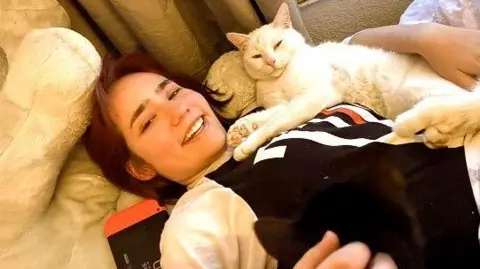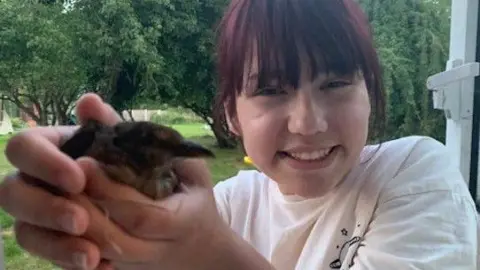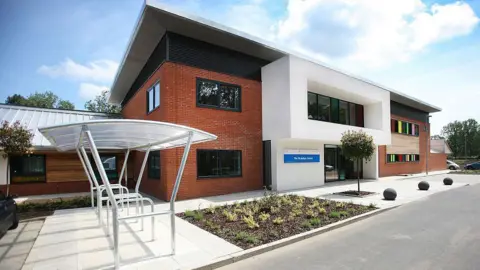Neglect at unit led to teenager's death - inquest
 Family handout
Family handoutNeglect at a mental health unit contributed to the death of a "happy and outgoing" 16-year-old, an inquest jury has heard.
Elise Sebastian, from Southminster near Maldon, Essex, was found unresponsive in her bedroom at the St Aubyn Centre in Colchester, in April 2021.
The teenager was supposed to have been receiving one-to-one care but, the inquest heard, an infrared alert system - which warned staff if she had been in her bathroom for too long - was muted, and she had been left alone for 28 minutes.
An inquest jury at Essex Coroner's Court unanimously agreed that Elise's death could have been prevented if it were not for multiple failures in her care.
The St Aubyn Centre, described in the hearing as "chaotic", is run by the Essex Partnership University NHS Foundation Trust (EPUT), currently the subject of an ongoing public inquiry.
Pravin Fernando, representing EPUT, admitted that Elise's room should have been locked to prevent the teenager entering alone, adding: "The trust accepts that these failings were causative of her death."
 Family handout
Family handoutThe inquest heard Elise had secured a place at Writtle College to work with animals and her parents described her as a "happy, outgoing, funny little girl".
She had been diagnosed with autism and her parents had become increasingly concerned about her anxiety and depression.
On 4 March 2021, after she had self-harmed a number of times, she was admitted for the second time to a ward at the unit.
'Poor wi-fi'
Essex area coroner Sonia Hayes heard how Elise had asked to go to the toilet, and although some doors may have been left open, others needed a staff swipe card to let her through.
The ward had introduced an infrared monitoring system called Oxevision, two months earlier as part of a trial, to reduce the risk of patients self-harming in isolated areas.
Handheld monitoring tablets were not working because of poor wi-fi, and the unit's clinical lead, Brian O'Donnell, did not think having someone allocated to monitoring the alerts on the main computer would be a "good use of their time".
During the inquest, expert witness Prof Jasmeet Soar said that when Elise was found, she had been in cardiac arrest for nine minutes.
He said there had been a four to five minute delay in staff using an oxygen mask, and a defibrillator took seven minutes for staff to use, instead of the three minute maximum mentioned in guidelines.
"Someone should have got the defibrillator and started it earlier," he added.
Prof Soar said the defibrillator also did not appear to have been used properly, from the readings he obtained, and had been switched on and off.
He said: "Some of the delays could have been avoided if staff would have known how to use the equipment."
 Family handout
Family handoutThe inquest also heard how the majority of staff in the unit were bank and agency workers who would not have known the children well.
Ms Hayes said she heard the ward "was clearly short staffed" and described how medical records appeared to be incomplete at times.
Mr O'Donnell said he had "constantly" raised concerns about staffing numbers with senior management, adding: "Our budget would always be overspent - my argument was that we were underfunded."
The inquest heard how observations should have a therapeutic interaction but some thought that was impossible to achieve.
Consultant child and adolescent psychiatrist Dr Malcolm Bourne also told the hearing that "staff needed support to deal with children who were challenging and that autism could make depression more difficult to treat".
 EPUT
EPUTShortly after Elise's death, the ward at the St Aubyn Centre was closed to new admissions by the Care Quality Commission.
The CQC report found understaffing was a "significant concern" made worse by managers not ensuring staff had the appropriate skills and experience to look after vulnerable patients.
'Deepest condolences'
The jury foreman told the inquest there were two main factors that probably caused the teenager's death.
The first was "poorly administered observations due to poor staffing levels and falsified information on observation forms".
He said the second was "Elise being able to gain access into her room and her observation level in an isolated area not being considered", which the jury believed had directly led to Elise's death.
The coroner said she would write a prevention of future death report which would recommend changes to make sure failures were not repeated.
Paul Scott, chief executive of EPUT, said: "I want to say sorry to Elise's family and to everyone who loved her that she did not receive the care she deserved, and I offer my deepest condolences."
Follow Essex news on BBC Sounds, Facebook, Instagram and X.
